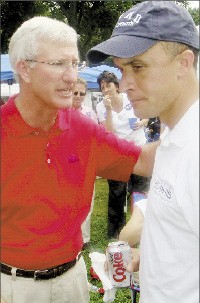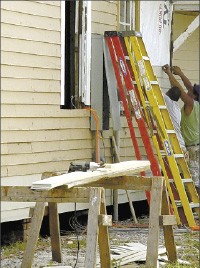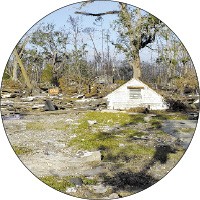“I’m ready to fight! I’m ready to roll my sleeves up!” Those words, delivered by a spunky Kathryn Bowers outside federal court on Tuesday, were, to say the least, a vivid contrast with her last several appearances before a group of assembled media.
The week before last, a glum-looking Bowers left a hearing before U.S. District judge John D. Breen, at which she asked for extra time to examine evidence and told reporters that her health was suffering because of stresses related to her situation as a Tennessee Waltz defendant.
The next week, a visibly drained Bowers announced her resignation from the state Senate on medical advice — an act that gave local Democrats a chance to nominate a successor for the November ballot. And only days after that she was pulled over and cited for DUI, after sideswiping a UPS truck on Interstate 240.
So who was this refreshed-looking woman in a spiffy white pantsuit smiling at ease Tuesday, with her equally relaxed attorney, Bill Massey, at her side?
Clearly, someone who, after reviewing the government’s video- and audiotapes and other evidence, decided she had a chance to beat the rap — unlike her predecessor in state Senate District 33, Roscoe Dixon, who was convicted earlier this summer of several counts of bribery and extortion similar to those confronting Bowers and now awaits sentencing.
“Not guilty,” Bowers said Tuesday morning, to the astonishment of almost everybody besides herself and Massey. Certainly, assistant U.S. attorney Tim DiScenza, chief prosecutor in the case, was buffaloed and confessed in court that he had been expecting an effort at plea bargaining and had been unprepared for what actually happened.
Tentatively, Bowers’ trial is set for April — though that could change as a result of a pre-trial hearing now set for January.
All of this had to have an impact on another Tennessee Waltz defendant, former state senator John Ford, Bowers’ colleague for the briefest of times in the General Assembly’s senior chamber.
A somewhat prescient Ford said last week, just before the news of Bowers’ DUI incident, that he harbored doubts that her resignation from the Senate necessarily meant she was determined on a change of plea to guilty. “She’s had real bad health,” Ford said then. “I’m privy to some stuff. I mean, long before all of this came up.”

Hobnobbing before last weekend’s Memphis-Ole Miss game at Oxford were former Mississippi governor Ronnie Musgrove (left) and Harold Ford Jr., the Democratic nominee for U.S. senator in Tennessee. Another local hopeful attending the game, won by the Rebels, was Steve Cohen, the Democrats’ nominee for Congress in the 9th District.
Ford, who resigned from the Senate more than a year ago, has from the beginning been considered the star player in the Tennessee Waltz saga. That’s largely because of his own longtime notoriety as a flamboyant and influential player on the state scene, but it owes something as well to the general fame of the Ford political family — particularly in a year when his nephew, 9th District congressman Harold Ford Jr., is a well-publicized candidate for the U.S. Senate.
John Ford’s trial for multiple counts of extortion and bribery was originally set for October, just before the fall election, but has been reset for early next year. The former senator said last week he wouldn’t disclose his legal strategy, but he promised “a correct presentation” and insisted, “I don’t have to prove anything. They have to prove something!”
One clue to what that correct presentation won’t include: any reference to the independent movie filmed by undercover informant Tim Willis in the same downtown office space where one of the government’s videotapes has shown then-Senator Ford pocketing FBI cash. That money, several thousand dollars worth, was handed over by a supposed representative of “E-Cycle,” a fictitious computer firm used as an FBI front.
“That’s news-media talk. That don’t mean nothing!” Ford scoffed about speculation that he might claim only to have been an actor in Willis’ fictional drama.
Republican gubernatorial candidate Jim Bryson‘s two-day visit to Memphis last week was characterized by an unusual form of ambivalence.
Bryson, a marketing specialist and freshman state senator from Franklin who has been regarded as a potential GOP star, is smart enough to know that incumbent Democratic governor Phil Bredesen is well ahead in all the categories that count — money, poll standing, and name recognition.
But Bryson also knows that Tennesseans as a whole may have become a bit uneasy about Bredesen’s health during the governor’s recent prolonged absence from the public eye — due to a mystery illness that was tentatively identified as caused by a tick bite.
Even key Republicans will say privately that the GOP nominee has little chance if the governor’s health holds up. But key Democrats will tell you privately that they are concerned about what could happen in the event of a further prolongation of Bredesen’s illness or a serious future relapse
Meanwhile, all the GOP challenger can do is keep his campaign going while the future sorts itself out.
Last Thursday night, Bryson’s statewide bus tour arrived in Shelby County — “county 94 in our 95-county tour,” as the candidate put it during a brief address at GOP headquarters in the Eastgate shopping center. (A Friday morning visit to the office of the Center for Independent Living would be the highlight of his second day in Memphis.)
At the Eastgate stop, Bryson revealed himself to be a ready man with a quip. He recalled that he had first run in 2002 for then state senator Marsha Blackburn’s seat, vacated that year by the soon-to-be-elected member of the U.S. House. “I ran for that seat to fill those pumps,” Bryson said.
Somewhat later, after alleging that Bredesen had referred to the issue of illegal immigration as “not my job,” Bryson paused for a couple of beats, then continued: “Pretty soon he’ll be right. It won’t be his job. It’ll be my job.”
As for serious content, Bryson rolled out a series of issues that seemed designed to out-do Bredesen on both his left and his right flanks. On the one hand, Bryson lamented the governor’s paring of some 200,000 Tennesseans from the TennCare rolls, maintaining that he himself had made a proposal that would have kept some 67,000 of that number — uninsurables, in the main — on the program’s rolls.
“He [Bredesen] said it was ‘reckless,'” Bryson said. ‘Well, it’s time we had a heart.”
As for the other flank, Bryson made a point of espousing the proposed amendment to the state constitution that would limit marriage to “one man and one woman” and that he, among other GOP legislators, had been instrumental in getting it on the November general election ballot.
Bryson said that he was “puzzled and disappointed” that the governor had not signed on to the amendment.
As eight new members of the Shelby County Commission were sworn in last Thursday, there was a mixture of the expected and the unexpected.
As many might have predicted, newly elected Henri Brooks conformed to what had become her habit as a state representative, rising for the Pledge of Allegiance but not reciting it.
Less predictable was the commission’s new seating arrangement. As devised by new chairman Joe Ford, the seats no longer begin with District 1, Position 1, and continue through District 5. They are arranged randomly. “I wanted to mix things up,” Ford explained. Visibly disappointed was new member Mike Ritz, who would have had first dibs under the old arrangement.
 Greg Cravens
Greg Cravens 
 Chris Davis
Chris Davis  Chris Davis
Chris Davis  Chris Davis
Chris Davis  Chris Davis
Chris Davis  Chris Davis
Chris Davis  Chris Davis
Chris Davis  Chris Davis
Chris Davis  Chris Davis
Chris Davis  Chris Davis
Chris Davis  Chris Davis
Chris Davis  Chris Davis
Chris Davis  Chris Davis
Chris Davis  Chris Davis
Chris Davis  Chris Davis
Chris Davis  Chris Davis
Chris Davis  Chris Davis
Chris Davis  Chris Davis
Chris Davis